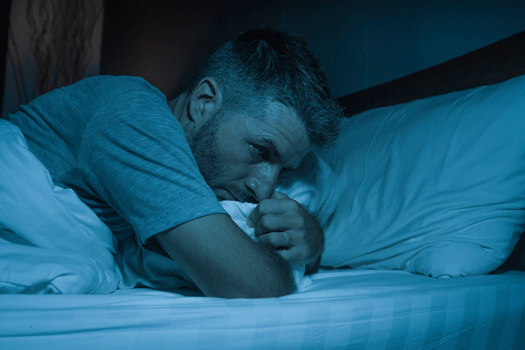
It is possible to have a herniated disc, also commonly known as a "slipped disc" or “ruptured disc,” and never know it. Other times, a nearby nerve is compressed or irritated. Even when this occurs, the resulting discomfort can vary throughout the day based on the individual’s movements and positions. One fairly common complaint with herniated discs is pain that gets worse at night. The information presented below explains why this may be the case and what can be done about it.
The Spine's Position Changes when Lying Down
When you are lying down at night, the inward curve of your spine shifts from the added pressure of your body, which can affect nearby nerves already irritated by the damaged disc. Whether or not this is a major issue for you depends on where the herniated disc is located. If it is in the lower back, which is common, you may notice more intense pain due to a narrowing of spinal nerve passageways. If the sciatic nerve is affected, you may have difficulty sleeping due to related leg pain.
Sleep Positions May Be an Issue
Herniated disc pain may also become worse at night because of your preferred sleep position. The recommended sleeping position with a lumbar herniated disc is on your back. This maintains neutral spinal alignment, which reduces the risk of related nerve issues. But if you are a side or stomach sleeper, the shifts in your spinal alignment could be why your disc pain is more noticeable at night.
Nighttime Habits Could Be a Factor
The things you do before bedtime may affect your back in a way that makes herniated disc pain more of an issue. For instance, having a heavy meal shortly before going to bed may increase inflammation. This raises the risk of nerve irritation within the affected area. Strenuous exercise should also be avoided right before bedtime if you have a herniated disc. The resulting muscle soreness could trigger inflammation or muscle spasms overnight.
You Do Not Move while Sleeping
A general lack of movement while you are sleeping could also contribute to herniated disc pain that is worse at night or when you first get up in the morning. In this case, the increased discomfort may subside once you start moving again during the day.
What to Do about Herniated Disc Pain at Night
Talk to your doctor if you are having an ongoing issue with increased herniated disc pain at night, especially if your ability to sleep well is significantly affected. Should this happen, your symptoms may seem worse because a lack of rest intensifies the perception of pain and increases the time needed for tissue healing. You may be able to minimize herniated disc pain at night by:
• Using strategically placed pillows as you sleep to maintain your spine's alignment
• Having a lighter or healthier snack before bed to naturally ease inflammation
• Timing when you take your medication so it takes effect overnight
If you have a herniated disc that is not responding to conservative treatment, a microdiscectomy may be the best option. Although this is generally a very successful procedure, patients with a large hole in the outer ring of the disc have a significantly higher risk of reherniation following surgery. Often, the surgeon will not know the size of the hole until beginning surgery, and having a large hole in the outer ring of the disc more than doubles the risk of needing another operation. A new treatment, Barricaid, is a bone-anchored device that closes this hole, and 95 percent of Barricaid patients did not undergo a reoperation due to reherniation in a 2-year study timeframe. This treatment is done immediately following the discectomy—during the same operation—and doesn’t require any additional incisions or time in the hospital.
If you have any questions about the Barricaid treatment, ask your doctor or contact us at 844-288-7474.
For full benefit/risk information, please visit: https://www.barricaid.com/instructions.


Comments